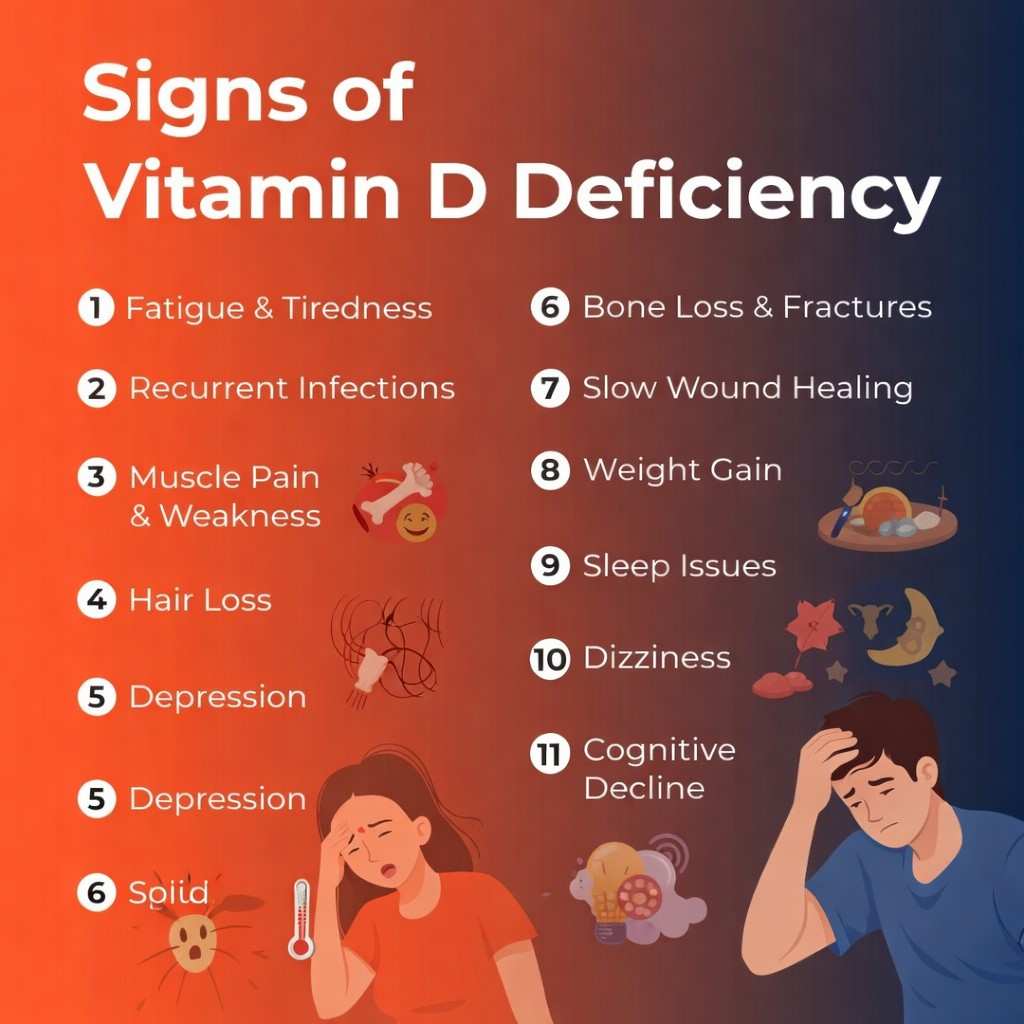A strong immune system, strong bones, and general wellbeing are all dependent on vitamin D. However, a large number of people worldwide are deficient in this vital nutrient.
The effects of vitamin D deficiency on the body will be discussed in this article on the ” What are the Top 14 Sign of Vitamin D deficiency.” We’ll go over the main symptoms, potential reasons, efficient remedies, and top vitamin D supplements to help you get back to normal. Your ability to safeguard your health and avoid long-term issues will improve if you are aware of these aspects.
What is vitamin D ?
A fat-soluble vitamin, vitamin D is essential for maintaining the health of our bones, teeth, muscles, musculoskeletal system, nervous system. and immune system. Often referred to as the “sunshine vitamin,” vitamin D is produced by our bodies naturally when our skin is exposed to sunlight. Additionally, it can be acquired through supplements or specific meals like egg yolks, fatty fish, and fortified dairy products.
Why Vitamin D is important to Our health ?
Your body requires a variety of vitamins to remain healthy, including vitamin D. It is essential for bone growth and maintenance as well as for preserving the proper ratio of calcium in your blood and bones.
To be more precise, vitamin D is necessary for your body to use calcium and phosphorus to support healthy tissues and create bones.
A decrease in the intestinal absorption of calcium and phosphorus causes hypocalcemia, or low blood calcium levels, in people with chronic and/or severe vitamin D insufficiency. This results in secondary hyperparathyroidism, when the parathyroid glands overproduce in an effort to maintain normal blood calcium levels.
If severe, both hyperparathyroidism and hypocalcemia can result in symptoms like depression, exhaustion, and cramping and weakness in the muscles.
What are the Top 14 signs of Vitamin D deficiency ?

- Muscle aches: Since vitamin D is necessary for maintaining the health of your muscles, they may indicate a shortage. Your muscles may become weak and achy if you don’t get enough vitamin D.
- Binge eating: Binge eating is a symptom of vitamin D insufficiency. Low vitamin D levels are frequently associated with impaired satiety and an inclination to overeat.
- Bone pain: Since vitamin D is necessary for maintaining healthy bones, this may indicate a vitamin D shortage. Without vitamin D, your bones might become weak and pain.
- Fatigue: Since vitamin D is necessary for cell metabolism, it may indicate a vitamin D shortage. You might always feel exhausted and exhausted if you don’t get enough vitamin D. You may find it challenging to do your daily tasks as a result.
- Decreased endurance: It could be challenging to sustain your energy levels throughout physical activity if you don’t get enough vitamin D. This may make it more difficult for you to engage in physical activity and could cause you to become exhausted too soon.
- Poor moods: These could indicate a vitamin D shortage because vitamin D plays a part in the metabolism of neurotransmitters, particularly serotonin, which is necessary for stable moods. You could struggle to keep a cheerful attitude and suffer from mood swings if you don’t get enough vitamin D.
- Sleep issues: For several reasons, this may indicate insufficient vitamin D levels. The brain regions and neural pathways that control the sleep-wake cycle may be impacted by vitamin D.
- Loss of hair: Since vitamin D is necessary for the reproductive cycle in the hair, this could indicate a shortage. Insufficient vitamin D prevents new hair from growing out of the hair roots.
- Slow wound healing: Your wounds healing slowly could be an indication that you are vitamin D deficient. This is because immune system processes depend on vitamin D.
- Dizziness: Since weak bones result from a lack of vitamin D, this may indicate a vitamin D deficiency. Dizziness may result from a weak cervical spine.
- Cardiovascular issues: Because vitamin D is necessary for maintaining the health of your heart cells, low levels of this mineral can raise your chance of developing heart disease.
- Weight gain: Since vitamin D is necessary to maintain a steady metabolism, this could indicate a deficit. You can have trouble losing weight if your metabolism slows down due to a lack of vitamin D.
- Recurrent infections: Since vitamin D is necessary to maintain a healthy immune system, they may indicate a shortage. White blood cell metabolism is influenced by vitamin D.
- Diminished cognitive function: Any impairment in your memory or cognitive function could be an indication that you are vitamin D deficient. This is because your brain needs vitamin D to stay healthy, and without it, you might have trouble remembering things or thinking effectively. Driving, cooking, and other daily tasks may become challenging as a result.
What is the causes of Vitamin D deficiency ?
- Insufficient consumption of sunlight and/or nutrition for vitamin D.
- Vitamin D isn’t getting absorbed or used by your body correctly.
- Darker Pigmentation of the Skin :Because darker skin has more melanin, the skin’s capacity to absorb vitamin D from sunshine is diminished.
- Having too much weight : Because it dissolves in fat, vitamin D can become stuck in fat tissue, reducing the body’s ability to use it.
- Health Issues Impacting Absorption
- Vitamin D absorption from meals can be decreased by digestive conditions such Crohn’s disease, celiac disease, and inflammatory bowel disease.
- The transformation of vitamin D into its active form is also impacted by some liver or renal diseases.
What to eat to prevent Vitamin d deficiency ?
There are several natural foods that can help prevent vitamin D deficiency.
- Salmon, trout, tuna, and mackerel are examples of fatty fish.
- Canned fish, such as sardines and herring
- yolks of eggs
- Liver from beef
- Liver from fish
Five foods fortified with vitamin D:
- Milk: Vitamin D is added to the majority of conventional milk and plant-based milks (such as soy or almond milk).
- Breakfast cereals: Vitamin D is already included in a lot of store-bought cereals.
- Orange juice: Certain manufacturers supplement their juice with vitamin D.

- Yogurt: Some yogurts contain additional vitamin D.
- Spreads and margarine: A lot of butter alternatives are enhanced with vitamin D.
Are Vitamin D supplement safe ?
Yes. At prescribed dosages, a vitamin D supplement has little side effects. It’s hard to take too much vitamin D unless you’re consuming large amounts because your body normally excretes what you don’t use.
extreme levels of vitamin D can lead to kidney stones, nausea, vomiting, disorientation, and extreme thirst. Before using any vitamin D supplements, consult your doctor about potential drug interactions.
What Are the Top 14 Signs of Vitamin D Deficiency: 4 Key Signs and When to Speak with a Medical Professional
Speak with a medical professional, particularly if you or your kid exhibits any of the following symptoms:
- Hair or bone loss
- Weariness
- Regular sickness or fractures of the bones without a known cause
- Pain in the muscles
A healthcare professional can evaluate your symptoms and provide diagnostic procedures, like as bloodwork, to measure your levels of vitamin D and other nutrients. If your results indicate a vitamin D shortage, they can suggest the appropriate dosage of vitamin D supplements.
Conclusion :
A robust immune system, healthy bones, and general wellbeing all depend on vitamin D. Weariness, bone discomfort, mood swings, recurrent diseases, and other health problems might result from a deficit. Getting enough sunshine, eating foods high in vitamin D, and taking supplements when necessary will help prevent deficiency. To check your vitamin D levels and take the necessary measures, it’s crucial to consult a medical expert if you experience symptoms or are at danger.
Vitamin D
- How do i know when my vitamin d is low ?Yes, a blood test that measures your levels of 25-hydroxyvitamin D (25(OH)D) indicates that you have a vitamin D deficit.
- How do you treat Vitamin D deficiency in children ?Medical-grade vitamin D supplements, usually cholecalciferol (D3), are used to treat vitamin D deficiency in children. These supplements are given at prescribed doses, usually daily or weekly, for a predetermined amount of time, such as six to twelve weeks.
- Can low Vitamin D Cause weight gain ?Although low vitamin D levels are not the direct cause of weight gain, they are known to be associated with obesity, and they may eventually make people more likely to gain weight.



